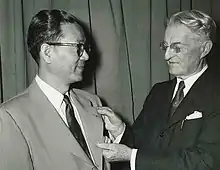John E. Swift
John Edward Swift (December 7, 1879 – August 19, 1967)[1] was an American judge who served as the ninth Supreme Knight of the Knights of Columbus from October 24, 1945, to August 31, 1953.
John Swift | |
|---|---|
| 9th Supreme Knight of the Knights of Columbus | |
 Swift and fellow Knight Chang Myon in New York City, August 1950 | |
| Church | Catholic Church |
| Installed | October 24, 1945 |
| Term ended | August 31, 1953 |
| Predecessor | Francis P. Matthews |
| Successor | Luke E. Hart |
| Other post(s) | 13th Deputy Supreme Knight of the Knights of Columbus (1939–1945) |
| Personal details | |
| Born | John Edward Swift December 7, 1879 Milford, Massachusetts, U.S. |
| Died | August 19, 1967 (aged 87) Osterville, Massachusetts, U.S. |
| Denomination | Roman Catholic |
| Spouse | Emily Swift |
| Alma mater | |
Early life
Swift was born in Milford, Massachusetts, in 1879 to Irish immigrants.[2] He received a bachelor's degree from Boston College in 1899 and a law degree from Boston University in 1902.[3] As a lawyer, he worked for Senator David I. Walsh and then with his brother Thomas in private practice.[3]
Career
United States federal work
Swift was a delegate to the Democratic National Conventions in 1916 and 1920 and was admitted to the Supreme Court Bar Association in 1917.[3] On May 17, 1933, he was appointed a Superior Court judge in Massachusetts to succeed Webster Thayer.[4]
Knights of Columbus
Swift joined the Knights of Columbus and was a member of Valencia Council 80 in Milford.[3] He served as grand knight, district deputy, state secretary, and finally was elected State Deputy of Massachusetts on May 10, 1927.[3] He became a Supreme Director in 1927 and then Deputy Supreme Knight in 1939.[4] He was elected Supreme Knight in 1945 and declined renomination in 1953.[4]
A staunch anti-communist, his denunciations of Soviet expansion led the USSR to veto Boston as the home of the United Nations.[4]
As Supreme Knight, he began a nationwide crusade against Communism. President Harry Truman endorsed the effort and mentioned in a letter to Swift that he hoped the entire membership "will join the crusade with zeal and enthusiasm."[5] Truman further stated, "[O]ur goal must be to drive out of our American life every movement which aims to promote within our borders any form of totalitarianism or any subversive movement."[5] Swift also convinced Truman to treat Spain fairly, and the Iberian country awarded him the Grand Cross of the Order of St. Raymond of Peñafort in recognition.[4]
In 1950, after a Special Audience with Pope Pius XII, Swift instituted a fund for the purchase and construction of the last playground in Rome. Primavalle, a newly populated district, was chosen for the site. This playground was named Pius XII and dedicated and blessed by Cardinal Francis Spellman, Archbishop of New York, on June 7, 1952.
Personal life
Swift was named a Massachusetts Superior Court Justice in 1947. His wife Emily died, aged 59, at their home in Milford on November 9, 1947, from a coronary thrombosis following a long illness. Swift died at his summer home in Osterville, Massachusetts, on August 19, 1967.[1]
Awards and honors
Swift was the recipient of three honorary degrees, the 1953 Catholic Action Medal, and the 1961 Lantern Award.[4] Pope Pius XII gave him at least three honors, including Order of Cape and Sword, which was reaffirmed by Popes John XXIII and Paul VI.[4]
References
- John E. Swift of Milford, Superior Court Justice Boston Globe (1960-1981); Aug 21, 1967, page 20.
- Lapomarda, Vincent A. (1992). The Knights of Columbus in Massachusetts (second ed.). Norwood, Massachusetts: Knights of Columbus Massachusetts State Council.
- Lapomarda 1992, p. 39.
- Lapomarda 1992, p. 41.
- Faith and fraternalism: the history of the Knights of Columbus, 1882-1982, Christopher J. Kauffman, Harper & Row, 1982, page 363.
External links
- Website of the Knights of Columbus
- New York Times, Mrs. John E. Swift Obituary, November 10, 1947, page 29.